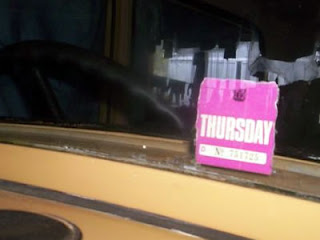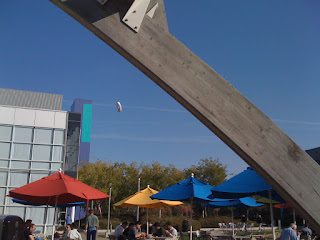In the heyday of the Internet boom, startups were wooing normally sage and conservative investors with crazy on-line get-rich-quick- schemes, all in the name of the
New Economy.
"See, its ok that we're not going to make any profit, and that we're going to burn a million bucks a month hiring geeks and paying for their parties and nerf weaponry, because - hey - its the New Economy. You don't need to actually monetize this stuff because everyone can see that this new web-enabled tom-foolery-powered service of ours is going skyward!"
There's a lot to be said about all that, like how it was marketing guys from Harvard and vulture capitalists from Wall Street, that really pushed the bubble skyward, not the geeks who just wanted to write code.
But I don't want to get distracted by the history of the New Economy because I'm only bringing up that old ancient history - so last decade - to make a comparison. A comparison with the New New Economy: Energy.
If you thought the dot.com
era was crazy, get ready to suspend disbelief and put away your financial sensibilities all over again, because a new cadre of oddball entrepreneurs are coming to Silicon Valley.
The really really irritating thing is that we do desperately need innovation on the energy front.
But there is a lot more chaff than wheat in these biodiesel, fuel-cell, solar, wind and other schemes - and the average joe, the man on the Clapham omnibus, and the investor are going to have a tough time seeing through it.
Remember post-9/11 when there was a need to
do something about terrorism, and a million fly-by-night companies and consultants sprung up to dip in the money pot? But there were not just those private sector types; there were also bureaucrats, and public-sector pencil-pushers in newly set up organizations; all because money was being thrown around and someone had to be there to scoop it up. Now this is tax-payers money I'm talking about, as well as investors money.
The same tax-payers waiting in huge long lines at the airport to have our bags searched and take our shoes off in some bizarre ritual designed to make us feel something is being done.
In the New New Economy there will be:
- Wacky schemes touted as "breakthroughs" designed to scoop up investment cash and venture capital
- Think-tanks, studies and websites that are actually FUD campaigns from PR companies paid by vested corporate interests, in Old Economy energy sectors like oil, coal and rubber
- Jumped up government organizations, full of idealism but with no power to do anything except generate press-statements
- Cynical government organizations, full of fat-cat bureaucrats who have just rotated out of some corporation
- Some genuine useful and profitable enterprises working with energy technologies that we already know to work well
What? No amazing new breakthroughs that genuinely advance energy technology?
See - its like this. All our energy comes from one place - a big nuclear reactor 93 million miles away. Its called the sun.
From the time before there were people and cars, the sun was putting energy into the Earth that wound up getting stored as coal and oil, but there's only a very small amount of that stuff.
The Sun has been storing it for millions of years.
We've been using it for a hundred years, and its close to gone.
Of course there's geothermal and similar energy sources, but when we talk about fuel, we're on track to
use it all up in the next 10 years or so. Maybe you don't believe that, maybe we'll all start driving Prius cars, and maybe the Tooth Fairy is real - maybe it will last 50 years.
That doesn't really matter, because it will all be gone in our lifetimes.
No more oil, no more petrol, for you or I.
And it'll take the sun another bunch of a million years to make more.
Our lifetimes? Great - lets wait until then to develop alternative energy.
Uhhh - except by then it will be too late.
Government and big business already had half-a-century of warnings that we needed to do something.
The first warning signs were back in 1973 when there was a
global oil crisis. Here's an excerpt from that linked article, by Brian Trumbore:
When OPEC announced the sharp price rise, the shock waves were immediate. Industrial democracies, accustomed to uninterrupted sources of cheap, imported oil, were suddenly at the mercy of a modern Arab nationalism, standing up to American oil companies that had once held their countries in a vise grip. Many of these "new" Arabs were Harvard educated and familiar with the ways of the West, and to many Americans it was impossible to understand how their standard of living was now being held hostage to obscure border clashes in strange parts of the world.
Later in the 70's more of the "new" Arabs flexing their power over the decadent west, led New Zealand (where I was living at the time) to introduce Carless Days, in an attempt to stem the haemorrhage of petro-dollars. In the USA we began to hear phrases like "strategic reserve" and "energy security".

If you had this sticker on your windscreen, no car for you on Thursday. Get a ride from your friend that has a "Friday" sticker, and then swap the next day.
This stuff affected peoples lives. But big oil, the auto industry, the technologists - what did they do after this big wakeup call? Produce cars that use more petrol, not less.
To find out about the rank bastardry of these companies read:
Both books talk about how National City Lines, a bus company, was setup by Standard Oil of California, General Motors and Firestone tyres in 1936 to scrap the electric public transit system of California. In 1940 by lobbying the government and using financial muscle they achieved this in Fresno, San Jose and Stockton, using their subsidiary Pacific City Lines. In 1944 they followed up by gutting the electric transit system in Los Angeles.
Two weeks ago I went on a trip to Monterey for my 3rd wedding anniversary, and we stayed in the lovely Old St Angela Guest House overlooking Monterey Bay. Sitting in the old brocaded lounge room, I spoke with an elderley gentlemen who recalled those days in Los Angeles.
He had a look of amazement and betrayal on his face, when he talked about how Standard Oil, Firestone tyres and General Motors had gotten away with this.
San Francisco still has its street cars, and these are as ever popular and effective a service as they always were. Why did those companies do what they did? For profit.
So the 1970's came and went and big autos and big oil just went right back to doing what they have always done. Profiting at our expense, and at the expense of our futures.
Now that we're staring down the barrel of a new energy crisis, what do you think those corporate guys are going to do?
More of the same.
They want a system where they control trucks delivering some product to a gas station and lots of obedient consumers queueing up to fork over their cash. They want cars to keep on being sold and folks to keep buying tyres to go on them.
So what can we rely on?
What is the real answer, if we can't rely the answer to come out of a bowser at a gas station?
The final answer is not going to be one magic product that solves everything. There is no magic bullet.
There is no scientific discovery just about to pop out of a test-tube at the HQ of Exxon-Mobil.
The final answer will be a
locality-based energy blend of the following:
- Electric power reticulated by conventional and DC smart-grids, and generated by:
- and to a much lesser degree, bio-fuels and alternative fuels
Because the key to solving this new crisis, and the key simultaneously to tapping into the New New Economy is not to think about "what do we put in our tanks?".
The June 21st-27th 2008 edition of
The Economist magazine, a dry publication of conservative British money-men, has a 14 page article on "The Future of Energy". It makes for interesting reading. When I received the paper copy in the mail I was amazed to see how frankly they were approaching the whole issue, and very very interested to see who they were predicting would be striking it rich in this new energy boom.
The old guard Standard Oil, Exxon-Mobile etc - they don't rate much of a mention.
Its the Silicon Valley entrepreneurs and the new innovators that The Economist is looking to for taking the lead.
From The Economist:
You don't hear much about the hydrogen economy these days. Nor fuel cells. The buzz-phrase is "plug-in hybrid".
Climate change, has hit all of our consciousnesses now. If Katrina wasn't enough - and you're not watching the international press to learn of environment disasters overseas - then pick up the "City of Moutain View - Water Quality '07" report and read the front page headline: "Drought Declared".
Governor Schwarzenegger declared the first statewide drought in 17 years. March and April 2008 were among the driest in California's recorded history.
Ordinary people are now caring deeply about climate change and looking for answers - they're buying fuel efficient cars, for that reason as well as for reasons of financial economy.
They've heard the
FUD about Hummer vs Prius and said "Are you kidding? Buy a gas guzzler when petrol is at these crazy prices?".
Here's the changes ahead:
Electric vehicles- 90% of private journeys in vehicles will be made in an all electric vehicle (either private vehicles or public transit systems)
- All motor-vehicle manufacturers still in business, will have performance and prestige vehicles that are electric powered and zero emission
- Alternative fuel vehicles will be a small and unpopular minority amongst consumers
- They will be seen as a backward, noisy, inconvenient and low-prestige option to the electric vehicle
- Electric cars will be refuelled by points at cafe's, supermarkets, company car parks - everywhere you see wireless internet offered now, free recharge points will be available
- Electric cars will "top up" via solar panels that add another 10% or more to the time between refuelling stops
- Compared with this convenience, the new fuel cells, and bio-fuels will be a very low-brow, beta-max option
Alternative Fuels- Other vehicles, such as long-haul trade vehicles; and a few passenger trips will be made in vehicles powered by alternative fuels
- fuels will be different state-to-state, county-to-county, due to cost driven factors such as local by-product availablity, for example sugar cane wastes; and costs of reticulation, storage and transport
- there will in general be no large scale production and reticulation of fuels by big companies
- Instead ethanol, and diesel substitutes such as pure vegetable oil will be supplied by an eclectic bunch of localized smaller and larger businesses capitalizing on supply of by-products in their area, for example corn husks, or timber mill waste
- These businesses will employ local labour and talent to meet the demand, instead of all the profits of the transport industry going to oil and petroleum monopolists
- aviation and defence will become far and away the biggest users of fossil fuels but both of these will be at a fraction of their current levels for a range of reasons
So there it is. My little bit of a futurism for the day.
Roll on the New New Economy.











.jpg)









